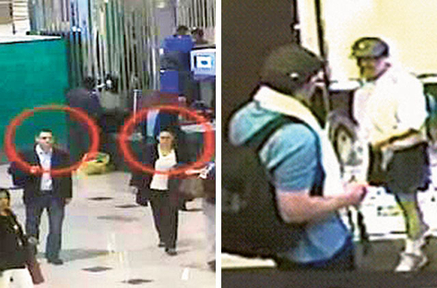On another gamechanger? – Omer Benjakob in Haaretz:
‘On January 10, 2010, Hamas’ point man with the Iranians, Mahmoud al-Mabhouh, was assassinated in Dubai. A month later, the local police force stunned the world – and Israel – by painstakingly piecing together hours of closed-circuit TV footage. The videos were combed to trace the 30 Mossad assassins’ steps and reveal their faces.
If Israel’s espionage agency had the technology currently being provided by the Israeli cyberfirm Toka 12 years ago, it’s likely the hit squad would have never been identified.
Toka was co-founded by former Israeli premier Ehud Barak together with the former Israel Defense Forces cyber chief Brig. Gen. (ret.) Yaron Rosen – and its capabilities are being revealed here for the first time.
The company sells technologies that allow clients to locate security cameras or even webcams within a given perimeter, hack into them, watch their live feed and even alter it – and past recordings – according to internal documents obtained by Haaretz and reviewed by a technical expert. Its activities are regulated by the Israeli Defense Ministry.’
(…)
‘According to the internal documents, as of 2021, the company had contracts with Israel valued at $6 million, and had also planned an “expansion of existing deployment” in Israel. Toka did not respond to Haaretz’s queries regarding its activities in Israel.’
(…)
‘While Israeli cyberoffense firms like the NSO Group or Candiru offer bespoke tech that can hack into popular devices such as smartphones and computers, Toka is much more niche, a cyber industry source explained. The firm links the worlds of cyberoffense, active intelligence and smart surveillance.
As well as co-founders Barak and Rosen, the company is run by two CEOs from the world of cyberdefense: Alon Kantor and Kfir Waldman. Among the firm’s backers are venture capitalists Andreessen Horowitz, an early investor in Facebook (its co-owner Marc Andreessen still has a seat on the Meta board; Meta is currently suing Israeli spyware maker NSO Group).
According to a company pitch deck obtained by Haaretz, Toka offers what it terms “previously out-of-reach capabilities” that “transform untapped IoT sensors into intelligence sources,” and can be used “for intelligence and operational needs.” (IoT stands for Internet of Things and refers here to web-connected cameras and even car media systems.)’
(…)
‘Security and web cameras have mushroomed in recent years and can be found everywhere: traffic intersections, street corners, malls, parking lots, hotels, airports and even our homes – from baby monitors to smart door buzzers. In order to broadcast a live feed that we can access via our phones or desktops, these cameras must connect somehow to the internet.
Toka’s system taps into these cameras and the different systems supporting them. This can be used for both operational and intelligence needs. For example, during a terror attack, a police force using the technology can remotely track the movement of fleeing terrorists across the city. It also allows covert collection and altering of visual data, which can be invaluable for military ops or criminal investigations.’
(…)
‘Technical documents reviewed by an ethical hacker prove that Toka’s tech can alter both live and recorded video feeds – all without leaving any forensics or telltale signs of a hack (in contrast to NSO’s Pegasus spyware, or Intellexa's Predator, which leave a digital fingerprint on targeted devices).
“These are capabilities that were previously unimaginable,” says human rights lawyer Alon Sapir. “This is a dystopian technology from a human rights perspective. Just its mere existence raises serious questions.
In theory, such tech can be abused, he says, “One can imagine video being manipulated to incriminate innocent citizens or shield guilty parties that are close to the system, or even just manipulative editing for ideological or even political purposes should it fall into the wrong hands,” he says.
Sapir explains that, legally, “intelligence collection is a sensitive issue. Despite a lack of legislation, the police deploy mass surveillance means they may not be fully authorized to use: technology like the HawkEye system, which no one knew about until the media revealed its existence”
Any video that is manipulated, he says, is inadmissible in an Israeli court as evidence. “A scenario in which someone is accused of something and doesn’t know if the evidence presented against them is real or not is truly dystopian. The current law does not begin to address situations like these.”
For Palestinians in the West Bank, the legal situation is totally different, he notes. “Take for example the Blue Wolf facial recognition technology, used by the IDF to keep track of Palestinians. The West Bank is Israel’s defense establishment testing ground – and a scenario in which Toka’s tech is deployed unbeknownst to anyone is simply terrifying.”
Sapir adds: “There have been cases in which video evidence helped refute false claims made by settlers and soldiers, and helped save innocent Palestinians from jail. We’ve also seen cases in which video evidence has been tampered with in the past.”’
(…)
‘Toka’s documents reveal the states with which Toka was in touch: Israel; the U.S.; Germany; Australia; and Singapore, a nondemocratic country. As of last year, talks for deals were also taking place with U.S. Special Operations Command (USSOCOM) and a U.S. “intelligence” agency.’
Read the article here.
This is truly dystopian, and potential game changer, I would say more than Stuxnet ever was.
If you are able to tamper with security cameras without leaving a finger print, change the footage without leaving a finger print, the whole idea of truth finding and evidence in court or outside it becomes so obscure that even the best court is at risk of becoming a kangaroo court.
Foucault wrote famously about games of truth but he didn’t know what these games were going to consist of.
I would say, forget the past. The games of truth have just begun.
